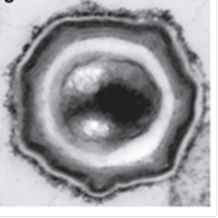Bacterial spores as building blocks for living materials

A broad range of bacteria belonging to the Firmicutes phyla can increase their resistance to challenging environmental conditions by forming spores. Spore formation follows a complex, highly regulated developmental pathway, which depends on biochemical conditions, such as nutrient supply and temperature. Once formed, dormant spores are able to survive biochemical insults for an extended time, as food-processing regimes and antiseptic procedures. When favorable biochemical conditions are restored, spores can sense it – behaving as exquisite biosensors- and recover the characteristics of a metabolically active cell, i.e. being able to grow and reproduce.
Spore formation and germination are fascinating processes from a technological viewpoint: the resistance of spores renders them hazardous contaminants in the clinical and industrial setting, while their sensing and revival capability could be exploited in the design of living and self-healing materials. Nevertheless, the biochemical determinants of sporulation and germination still present many open questions.
In a project at the interface between biology and material science, we intend to explore the biochemical conditions that can induce sporulation and how they tune the properties of the formed spores, using the model organism Bacillus subtilis. We will focus on the size, the polydispersity and the surface charge of the spores, and examine their changes when nutrients, temperature and time of the sporulation are changed. This characterization will pave the way to investigate the formation of 2D and 3D materials using spores as building blocks – a stepping stone for developing spore-based living materials.
During the project, you will learn protocols for the preparation of spores and you will apply standard particle characterization techniques, such as dynamic light scattering and zeta-potential measurements, to them. You will also become familiar with advanced microscopy techniques, including optical microscopy and atomic force microscopy.
If you are interested in this challenging project, please contact Dr. Secchi () or Prof. Isa (). This project is only offered as an MSc thesis and is available to start as soon as possible upon agreement.
